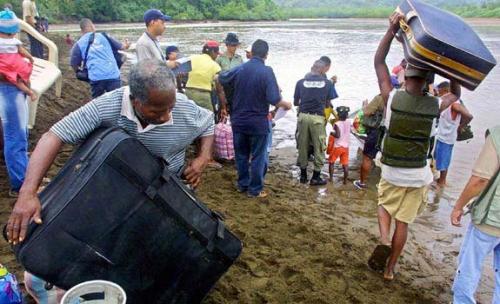World Refugee Day: "Open your eyes to our suffering"
- Análisis

Today, June 20th, is World Refugee Day. According to the United Nations High Commissioner for Refugees (UNHCR), the number of displaced people worldwide surpasses 40 million people, or one out of every 136 people is in this situation.
The state of the millions of migrants from the South in the recipient countries of the North is difficult, especially for those in irregular conditions. But that of refugees is the most distressing, since, having fled suddenly from wars, conflicts or other violent situations in order to save their lives, as a general rule, they cannot return to their country of origin due to threats against their lives.
"Refugees are people who have to flee against their will. Expelled from their villages and cities, separated from their families by conflict or persecution, refugees move away in search of security," states the UN High Commissioner for Refugees, António Guterres of Portugal.
Sharing a similar fate to refugees, internally displaced people are those who escape from violence within their own countries, but who cannot or do not want to go into exile in another country.
Latin America has known the drama of the refugee from the 70s and 80s of the last century, when military dictatorships ravaged the Southern Cone and armed conflicts were sparked in
Plan
According to human rights organizations, the displacement of populations to other regions within
Refugees in Ecuador
The number of Colombian applicants for refugee status in Ecuador from 2000 to 2007 totals 45,381, of which 14,300 have been approved according to UNHCR. Nevertheless, this same organization indicates that there are 250,000 Colombians in
The situation of Colombian refugees in
"While I am denied refugee status, I become part of what they call the gray zone, or the place for people with irregular status, without papers, without the right to work, and without access to healthcare, social security, or education," illustrates clearly Orlando Valencia, coordinator of the Association of Colombian Refugees in Ecuador (ARCOE).
Another Colombian, Jairo Restrepo,(2) who has also been denied refugee status, indicates that in
In order to confront such denial of their rights and to make their plight more visible, 150 families (600 people) have become organized as part of ARCOE aiming to influence public policies concerning refugees, to train their members and to draw the attention of South American governments and of the international community into supporting programs that favor Colombian refugees in Ecuador.
Invisibility, the situation of many Colombians fleeing from violence, still has not been dealt with in depth either by the Ecuadorian state or by Ecuadorian society, and much less by the Colombian government. Guillermo Robayo, Director of the Jesuit Refugee Service in Ecuador, indicates that "for about 6 or 7 years, the approach of the Ecuadorian government toward refugees has been framed by national security, which is to say zero human rights, and, secondly, to not have a clear policy on migration and specifically that involving refugees."
The government of Rafael Correa has launched Plan
To conclude, Jairo Restrepo calls out to Ecuadorians and Latin Americans: "I would ask them to open their eyes to our grievances, our suffering and pain and consider that, just as we are suffering here and have needs, and yet we are viewed with contempt, that they should realize that it’s the same thing their family members are going through in the United States, Italy or Europe. The only difference is that they have left for economic reasons and we have come here under duress and obliged to do so in order to save our lives."
Notes
(1) INREDH, “Refugiados y trabajadores, Las condiciones laborales de las mujeres en situación de refugio,” Quito, 2006, p17.
(2) Concerning the motivations for which he had to leave Colombia and take refuge in Ecuador, Jairo Restrepo (not his real name for security reasons) declared: “What they wanted is for me spy for them, to gossip and spread rumours. However, if people found out what I was up to, they would wipe me out and if I didn’t do want they said, they would also wipe me off the map. So I was stuck. So they said to me, it’s 6:30 pm right now. Tomorrow, we’ll come by at the same time for the answer and we won\'t take lukewarm for an answer. It\'s either hot or cold. You\'re with them or with us. We don’t want people in the middle. I didn’t have any another option, so I left with only what I had on, and stayed for six months with a brother-in-law in Huila. Then one day, at six in the morning some armed men arrived asking for me, saying that I’d left without permission and that for this reason I had been declared a military target. After they left, I headed for the state highway, got in the first vehicle I could and arrived as far as Moncoa and later entered Ecuador, frightened, without money and without knowing anyone.”
Del mismo autor
- La derecha, Facebook y el odio a Chávez 06/02/2020
- Galápagos: De patrimoine de l’humanité à porte-avions des USA ? 17/01/2020
- Revuelta popular tumbó el paquetazo del FMI… pero las heridas quedan 15/10/2019
- Ecuador: A curfew and the people still resist 13/10/2019
- Ecuador: Toque de queda y la gente resiste 12/10/2019
- Austerity measures of Moreno and the IMF mobilize Ecuadorians 09/10/2019
- Paquetazo de Moreno y del FMI moviliza a ecuatorianos 07/10/2019
- Galapagos: from world heritage to aircraft carrier of the US? 09/07/2019
- Galápagos: ¿de patrimonio de la humanidad a portaviones de EEUU? 02/07/2019
- 2 años de Lenin Moreno: Giro total a la derecha 23/05/2019
